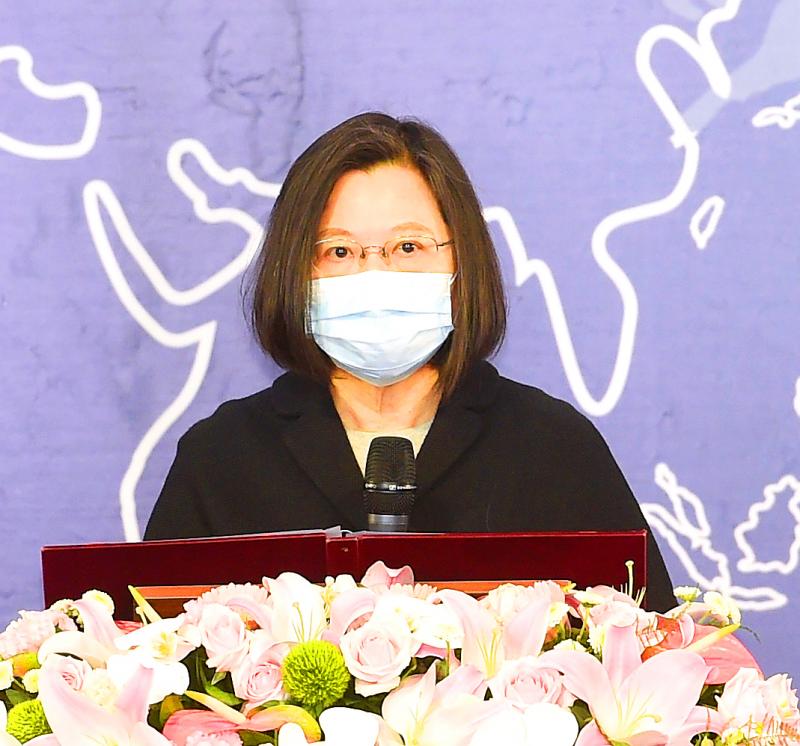Taiwan has made considerable progress in improving its human rights situation, President Tsai Ing-wen (蔡英文) said yesterday at an event marking World Human Rights Day on Thursday, with victims of political persecution among the audience.
The ceremony took place at the National Human Rights Museum and the Jing-Mei White Terror Memorial Park in New Taipei City, which was formerly a prison run by the Taiwan Garrison Command to incarcerate political dissidents.
“Taiwan has seen concrete progress in transitional justice in the past few years. People from across generations have joined the effort, achieving positive results for transitional justice, as well as to strive for more vigorous protection of human rights. These will ensure that our freedom and democracy will last into the future,” Tsai said.

Photo: Fang Pin-chao, Taipei Times
“These efforts and progress can help us face the suffering and agony of the past, and resolve to never repeat history. Then we can join together to advance forward and build a common future,” she added.
Tsai listed her administration’s accomplishments in carrying out transitional justice, such as the establishment of the Transitional Justice Commission to investigate past institutional abuses and atrocities against people to restore justice and truth, overturn wrongful convictions against victims, and disclose secret government files.
Tsai pointed to the establishment of the National Human Rights Museum two years ago to promote human rights education and document Taiwan’s progress from authoritarianism to a democratic society.
“People can see the positive results of human rights education, and also exhibits and research work at the museum. It has undertaken multifaceted programs to combine arts, literature, music and other forms to disseminate the concept of human rights in people’s daily lives,” she said.
Tsai also lauded the establishment of the National Human Rights Commission on Aug. 1, an independent agency of the Control Yuan that is tasked with probing rights violations, reviewing the implementation of human rights policies and presenting national reports on human rights.
Control Yuan President Chen Chu (陳菊) was previously a victim of political persecution, so she has empathy for the victims and their families, and for their burden of pain and pressure, Tsai said, adding: “Under Chen Chu’s leadership, I believe the commission can strengthen the protection of human rights, and pass [it] on to our future generations.”
In her address, Chen said she wants to “thank the many respected elders and victims of political persecution who came before me, because they refused to succumb under the past authoritarian one-party state. It is they who enabled Taiwan to have the energy to fight for our freedom and democracy.”
“To them and their families who suffered together, we are grateful for their agony and sacrifice — they helped make Taiwan a land of beauty and freedom — and for attaching great importance to human rights protection,” Chen said.

INVESTIGATION: The case is the latest instance of a DPP figure being implicated in an espionage network accused of allegedly leaking information to Chinese intelligence Democratic Progressive Party (DPP) member Ho Jen-chieh (何仁傑) was detained and held incommunicado yesterday on suspicion of spying for China during his tenure as assistant to then-minister of foreign affairs Joseph Wu (吳釗燮). The Taipei District Prosecutors’ Office said Ho was implicated during its investigation into alleged spying activities by former Presidential Office consultant Wu Shang-yu (吳尚雨). Prosecutors said there is reason to believe Ho breached the National Security Act (國家安全法) by leaking classified Ministry of Foreign Affairs information to Chinese intelligence. Following interrogation, prosecutors petitioned the Taipei District Court to detain Ho, citing concerns over potential collusion or tampering of evidence. The

‘FORM OF PROTEST’: The German Institute Taipei said it was ‘shocked’ to see Nazi symbolism used in connection with political aims as it condemned the incident Sung Chien-liang (宋建樑), who led efforts to recall Democratic Progressive Party (DPP) Legislator Lee Kun-cheng (李坤城), was released on bail of NT$80,000 yesterday amid an outcry over a Nazi armband he wore to questioning the night before. Sung arrived at the New Taipei City District Prosecutors’ Office for questioning in a recall petition forgery case on Tuesday night wearing a red armband bearing a swastika, carrying a copy of Adolf Hitler’s Mein Kampf and giving a Nazi salute. Sung left the building at 1:15am without the armband and apparently covering the book with a coat. This is a serious international scandal and Chinese

Seventy percent of middle and elementary schools now conduct English classes entirely in English, the Ministry of Education said, as it encourages schools nationwide to adopt this practice Minister of Education (MOE) Cheng Ying-yao (鄭英耀) is scheduled to present a report on the government’s bilingual education policy to the Legislative Yuan’s Education and Culture Committee today. The report would outline strategies aimed at expanding access to education, reducing regional disparities and improving talent cultivation. Implementation of bilingual education policies has varied across local governments, occasionally drawing public criticism. For example, some schools have required teachers of non-English subjects to pass English proficiency

TRADE: The premier pledged safeguards on ‘Made in Taiwan’ labeling, anti-dumping measures and stricter export controls to strengthen its position in trade talks Products labeled “made in Taiwan” must be genuinely made in Taiwan, Premier Cho Jung-tai (卓榮泰) said yesterday, vowing to enforce strict safeguards against “origin laundering” and initiate anti-dumping investigations to prevent China dumping its products in Taiwan. Cho made the remarks in a discussion session with representatives from industries in Kaohsiung. In response to the US government’s recent announcement of “reciprocal” tariffs on its trading partners, President William Lai (賴清德) and Cho last week began a series of consultations with industry leaders nationwide to gather feedback and address concerns. Taiwanese and US officials held a videoconference on Friday evening to discuss the